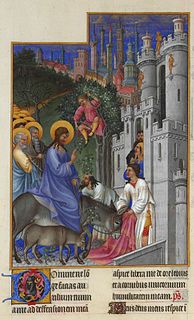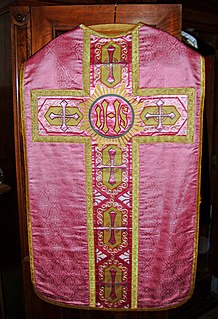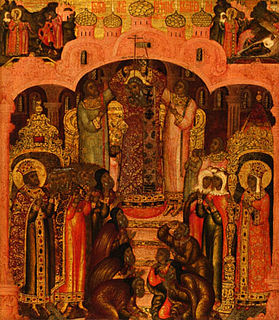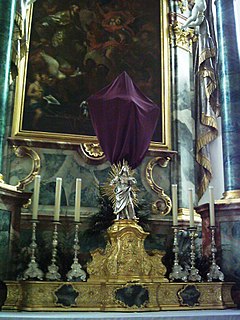
Easter, also called Pascha or Resurrection Sunday, is a festival and holiday commemorating the resurrection of Jesus from the dead, described in the New Testament as having occurred on the third day after his burial following his crucifixion by the Romans at Calvary c. 30 AD. It is the culmination of the Passion of Jesus, preceded by Lent, a 40-day period of fasting, prayer, and penance.

The liturgical year, also known as the church year or Christian year, as well as the kalendar, consists of the cycle of liturgical seasons in Christian churches that determines when feast days, including celebrations of saints, are to be observed, and which portions of Scripture are to be read either in an annual cycle or in a cycle of several years.

In Christianity, Holy Week is the week immediately preceding Easter. It is also the last week of Lent, in the West, – Palm Sunday, Holy Monday, Holy Tuesday, Holy Wednesday, Maundy Thursday, Good Friday, and Holy Saturday – are all included. However, Easter Day, which begins the season of Eastertide, is not.

The Feast of Corpus Christi, also known as the Solemnity of the Most Holy Body and Blood of Christ, is a Roman Catholic, Anglican, and Western Orthodox liturgical solemnity celebrating the Real Presence of the Body and Blood, Soul and Divinity of Jesus Christ in the elements of the Eucharist. Two months earlier, the institution of the Eucharist at the Last Supper is observed on Maundy Thursday in a sombre atmosphere leading to Good Friday. The liturgy on that day also commemorates Christ's washing of the disciples' feet, the institution of the priesthood and the agony in the Garden of Gethsemane.

The Annunciation, also referred to as the Annunciation to the Blessed Virgin Mary, the Annunciation of Our Lady, or the Annunciation of the Lord, is the Christian celebration of the announcement by the Archangel Gabriel to the Blessed Virgin Mary that she would conceive and become the mother of Jesus, the Jewish messiah and Son of God, marking His Incarnation. Gabriel told Mary to name her son Jesus, meaning "YHWH is salvation".

The Octave of Easter is the eight-day period (octave) in Eastertide that starts on Easter Sunday and concludes with the following Sunday.

Laetare Sunday is the fourth Sunday in the season of Lent, in the Western Christian liturgical calendar. Traditionally, this Sunday has been a day of celebration, within the austere period of Lent. This Sunday gets its name from the first few words (incipit) of the traditional Latin entrance (Introit) for the Mass of the day. "Laetare Jerusalem" is Latin from Isaiah 66:10.

In the Christian liturgical calendar, there are several different Feasts of the Cross, all of which commemorate the cross used in the crucifixion of Jesus. Unlike Good Friday, which is dedicated to the passion of Christ and the crucifixion, these feast days celebrate the cross itself, as the sign of salvation. In Roman Catholicism, Eastern Orthodoxy, and Anglicanism the most common day of commemoration is September 14.
The Solemnity of Our Lord Jesus Christ, King of the Universe, commonly referred to as the Feast of Christ the King or Christ the King Sunday, is a relatively recent addition to the Western liturgical calendar, having been instituted in 1925 by Pope Pius XI for the Roman Rite of the Catholic Church. In 1970 its Roman Rite observance was moved to the final Sunday of Ordinary Time. Therefore, the earliest date on which it can occur is 20 November and the latest is 26 November. The Anglican, Lutheran, and many other Protestant churches also celebrate the Feast of Christ the King, which is contained in the Revised Common Lectionary. Roman Catholics adhering to the Extraordinary Form of the Roman Rite use the General Roman Calendar of 1960, and as such continue to observe the Solemnity on its original date of the final Sunday of October. It is also observed on the same computed date as the final Sunday of the ecclesiastical year, the Sunday before the First Sunday of Advent, by Western-rite parishes of the Russian Orthodox Church Outside Russia.

Eastertide or Paschaltide is a festal season in the liturgical year of Christianity that focuses on celebrating the Resurrection of Jesus Christ. It begins on Easter Sunday, which initiates Easter Week in Western Christianity, and Bright Week in Eastern Christianity. There are several Eastertide customs across the Christian world, including sunrise services, exclaiming the Paschal greeting, clipping the church, and decorating Easter eggs, a symbol of the empty tomb. The Easter lily, a symbol of the resurrection, traditionally serve as the chancel flowers that decorate the chancel area of churches throughout Eastertide. Other Eastertide customs include egg hunting, eating special Easter foods and watching Easter parades.
The Introit is part of the opening of the liturgical celebration of the Eucharist for many Christian denominations. In its most complete version, it consists of an antiphon, psalm verse and Gloria Patri, which are spoken or sung at the beginning of the celebration. It is part of the Proper of the liturgy: that is, the part that changes over the liturgical year.

A lectionary is a book or listing that contains a collection of scripture readings appointed for Christian or Judaic worship on a given day or occasion. There are sub-types such as a "gospel lectionary" or evangeliary, and an epistolary with the readings from the New Testament Epistles.

Easter Vigil, also called the Paschal Vigil or the Great Vigil of Easter, is a liturgy held in traditional Christian churches as the first official celebration of the Resurrection of Jesus. Historically, it is during this liturgy that people are baptized and that adult catechumens are received into full communion with the Church. It is held in the hours of darkness between sunset on Holy Saturday and sunrise on Easter Day – most commonly in the evening of Holy Saturday or midnight – and is the first celebration of Easter, days traditionally being considered to begin at sunset.

Passiontide is a name for the last two weeks of Lent, beginning on the Fifth Sunday of Lent, long celebrated as Passion Sunday, and ending on Holy Saturday.

Asperges is a name given to the rite of sprinkling a congregation with holy water. The name comes from the first word in the 9th verse of Psalm 51 in the Latin translation which is sung during the traditional form of the rite except during Eastertide. The 51st Psalm is also one of the antiphons that may be sung in the rite under the Mass of Paul VI.
Cheese Sunday is the fourth Sunday of Eastertide, being the third Sunday after Easter Sunday. It is called this because in the liturgy of the Catholic Church and the Lutheran Church the first line of the introit for that day's Mass is "Jubilate Deo omnis terra" from Psalm 66 (65).
"Octave" has two senses in Christian liturgical usage. In the first sense, it is the eighth day after a feast, reckoning inclusively, and so always falls on the same day of the week as the feast itself. The word is derived from Latin octava (eighth), with dies (day) understood. In the second sense, the term is applied to the whole period of these eight days, during which certain major feasts came to be observed.

The Feast of the Annunciation, contemporarily the Solemnity of the Annunciation, also known as Lady Day, the Feast of the Incarnation, Conceptio Christi, commemorates the visit of the archangel Gabriel to the Virgin Mary, during which he informed her that she would be the mother of Jesus Christ, the Son of God. It is celebrated on 25 March each year. In the Roman Catholic Church, when 25 March falls during the Paschal Triduum, it is transferred forward to the first suitable day during Eastertide. In Eastern Orthodoxy and Eastern Catholicism, it is never transferred, even if it falls on Pascha (Easter). The concurrence of these two feasts is called Kyriopascha.

The Lutheran liturgical calendar is a listing which details the primary annual festivals and events that are celebrated liturgically by various Lutheran churches. The calendars of the Evangelical Lutheran Church in America (ELCA) and the Evangelical Lutheran Church in Canada (ELCIC) are from the 1978 Lutheran Book of Worship and the calendar of Lutheran Church–Missouri Synod (LCMS) and the Lutheran Church - Canada use the Lutheran Book of Worship and the 1982 Lutheran Worship. Elements unique to the ELCA have been updated from the Lutheran Book of Worship to reflect changes resulting from the publication of Evangelical Lutheran Worship in 2006. The elements of the calendar unique to the LCMS have also been updated from Lutheran Worship and the Lutheran Book of Worship to reflect the 2006 publication of the Lutheran Service Book.

The Ambrosian Rite is a Latin Catholic liturgical Western Rite used in the area of Milan. The Traditional Ambrosian Rite is the form of this rite as it was used before the changes that followed the Second Vatican Council.
















